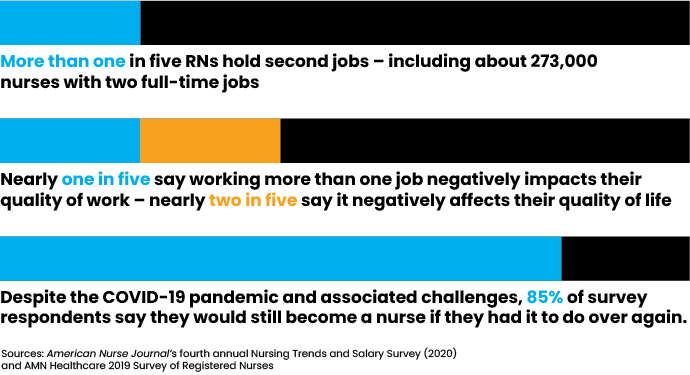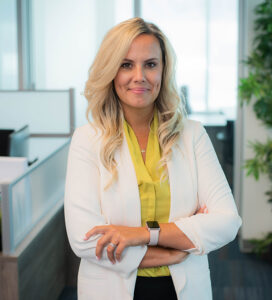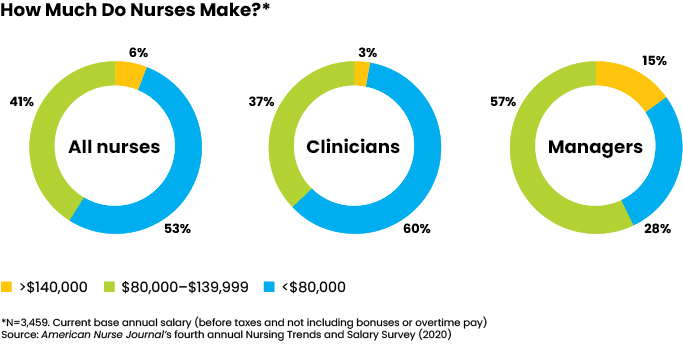Nurses, along with other healthcare workers, have been celebrated as heroes during the COVID-19 pandemic. They’ve been thanked with complimentary coffee at Starbucks and meals at McDonald’s, retailer discounts, cheerful lawn signs and nightly neighborhood claps — gestures very much appreciated. What many nurses really need, though, is someone to help them assess their financial health and get them on track for retirement.
Their planning hasn’t fallen through the cracks just because of pandemic-related stress or shift work sleep disorder (SWSD). Instead, especially for nurses approaching retirement age, it’s the cumulative effect of a lifetime of caring for everyone else — at work and outside of work — that leaves little time or energy to focus on their financial futures, financial advisor Betsy Madonna tells me.
It’s also the nature of their career paths. Nurses often cobble together multiple part-time jobs that offer the extra income and flexible hours they need but may not provide the best — or any — retirement plans. And nurses who have participated in employer-sponsored plans may have accumulated too many to keep track of.
“I think a lot of them in their 50s look at their employment histories — and they’ve worked at four to six hospitals, surgery centers and doctors offices — and they really just run out of time,” says Madonna, a partner and wealth manager in the Plymouth Meeting, Pa., offices of Steward Partners Investment Advisory LLC, an independent RIA firm.
“It’s like this goose chase for all these different retirement plans they left behind when they changed jobs,” she says, “or when their hospitals were taken over by another network, or whatever it may be.”
When nurses finally do get hold of someone in a back office to discuss a plan, they, like many plan participants, often don’t know what to say, she says. If they’re sent the wrong paperwork, “all of a sudden, it’s six months later,” she says, and they still don’t have answers. When onboarding clients, she immediately helps them organize their old retirement plans and figures out exactly how much they have in retirement savings.

Nurses make up about 70% of Madonna’s fee-based practice, which she says has evolved organically through client referrals. Her mother is a nurse. So are three of her aunts and seven of her first cousins.
“It wasn’t until my mom was in her early 50s that [my parents] took a step back and thought, ‘Oh wow, we need to figure this out,’” she said. “Five different hospitals in her career and a ton of different retirement plans/403(b)s/pensions left behind.” This aha moment occurred before Madonna became a financial advisor.

Madonna started building her niche client base a few years ago after a cousin who was a nurse at Children’s Hospital of Philadelphia (CHOP) told her the hospital was discontinuing its pension for most of its employees. It provided employees with a lot of information about their options but it was confusing and daunting, especially for busy healthcare professionals. Her cousin sought her advice and referred her to colleagues.
When an employer decides to get rid of a pension plan, “people get scared,” says Madonna, about the solvency of the plan. “They think, well, what if I’m in my 70s and they say, ‘Sorry we really can’t pay you for the rest of your life,’ and they offer them a lowball offer?”
So Madonna became an expert on the 100-or-so-page document her cousin received by pouring through it. For her cousin, she saw three possibilities: Take all of the money as a withdrawal, but pay a good chunk of taxes and a 10% penalty; roll it into her 403(b) plan; or roll it into her traditional IRA, which Madonna would help manage.
Madonna ended up speaking with about 60 nurses from CHOP, she says. She spoke with them at all hours to accommodate their schedules. They often told her, “It’s like a different language, I don’t have the time to understand or to call, and they’re talking over my head,” she says, about the information they had received through the hospital. She doesn’t fault the human resources staff for the confusion because they’re not financial advisors, she says.
Madonna walked the nurses one-by-one through their options. “Everyone’s situation is different,” she says. “You have to give them all their options and the pros and cons of each, and be very transparent.” She was careful not to steer any nurse in one direction, she says.
Most of the nurses who decided to keep their pensions were in their late 50s and 60s. It made sense for them, she says, but not for everyone else. About half the nurses she spoke with rolled their pension money into IRAs and enlisted her to manage it. Many others rolled their funds into their 403(b) plans; some used it to pay down credit card debt. “It’s a shame,” she says, to raid pension money, but “at the end of the day it’s their decision.”
Balancing Act
Planning for retirement is challenging for nurses of all ages, says Madonna. “The first 10-20 years as a nurse and mom, you are focused on paying the bills and paying your student loans off,” she says. Many also pay out-of-pocket to further their education, she adds.
Madonna’s mother worked the nightshift (from 7 p.m. to 7 a.m.) while raising four children. After little sleep, she studied for her bachelor’s degree in nursing. It wasn’t a requirement back then for nurses, notes Madonna, but it was essential to climb the ladder. Her mother later earned her master’s degree in nursing informatics.
Madonna quips that children of nurses have to throw up not just once but twice to stay home from school. “You have to literally be dying,” she says, “because they see so much worse at the hospital and they have no sympathy for you.” But she learned a lot about caring for others from her parents. For Take Your Daughter To Work Day, she says, she could accompany her mother to her nightshift or embalm bodies with her father, an undertaker.
Work-life balance often doesn’t get easier for nurses once their children are grown. “When there is a nurse in the family, I would argue that most of the time they are the ones that take care of their parents,” says Madonna, even when other relatives pitch in.
Beyond caring for their elderly parents, nurses also end up scheduling their appointments, calling Medicare or Medicaid, and taking care of parents’ wills and other paperwork, she says — all time zappers.
All four of her grandparents moved in with her parents at different times and her mother took care of them there until they died. Now 63, she expects to work about four more years as a nurse and she also babysits her grandchildren a couple days a week.
The demands and risks associated with COVID-19 have gotten more nurses thinking about retiring sooner than planned, says Madonna, but the reality is many of them are not financially prepared to do so.
“I was talking to a client last night and she said, ‘I’ve been doing 16-hour shifts at the VA hospital forever; I can do this in my sleep. But it’s so hard to do this with all this stuff on,’” says Madonna. “This stuff” includes Hazmat suits and masks.
Also, “I have a client with terrible arthritis, but she has to work until next August, and she works with her hands all the time,” says Madonna. Even for healthy clients in their 50s and 60s, she says, “It’s just becoming mentally and physically really hard.” As nurses age, they sometimes seek out less physically demanding positions in the profession.
I asked Madonna if doctors are usually much better prepared than nurses for retirement — not based on how much more they often typically earn and can potentially save, but in terms of how they approach the planning process.
In her experience, she says, “Most of the time you’re in a different tax bracket, you’re in a different world than the nurses.”
Doctors are more likely to work with accountants, “and if you have an accountant, there’s a good chance you have a financial advisor,” she says. “These things are usually set up from the get-go for high-income earners.”
“Not that nurses don’t make great money because, don’t get me wrong, a lot of them really do make a great living — but it’s different,” she adds. It’s also less likely, she says, that a nurse earns enough money that enables a spouse to stay home. With both spouses very busy juggling work and home, planning is more likely to get relegated to the someday file.

When Madonna started talking to the nurses at Children’s Hospital of Philadelphia about the disbanding pension fund, many saw the opportunity to finally have a relationship with an advisor. “They wanted to really sit down, and they wanted to figure out their spouse’s retirement plans and get their stuff organized,” she says. Some of them opened accounts for their children, and they also wanted to learn how to build wealth with their savings.
She frequently goes through income worksheets with her clients to figure out how much money they have left over every month and how much they can invest, using a balanced approach, to achieve their goals. She has been able to tell clients, “You could put a down payment on a house at the Jersey Shore in seven years,” she says, “or you could put an addition on your house in five years.”
Now that they have finally gotten financially organized and have strategies, says Madonna, “they feel so much better, like a weight has been lifted off their shoulders.”
Jerilyn Klein is editorial director at Rethinking65.







